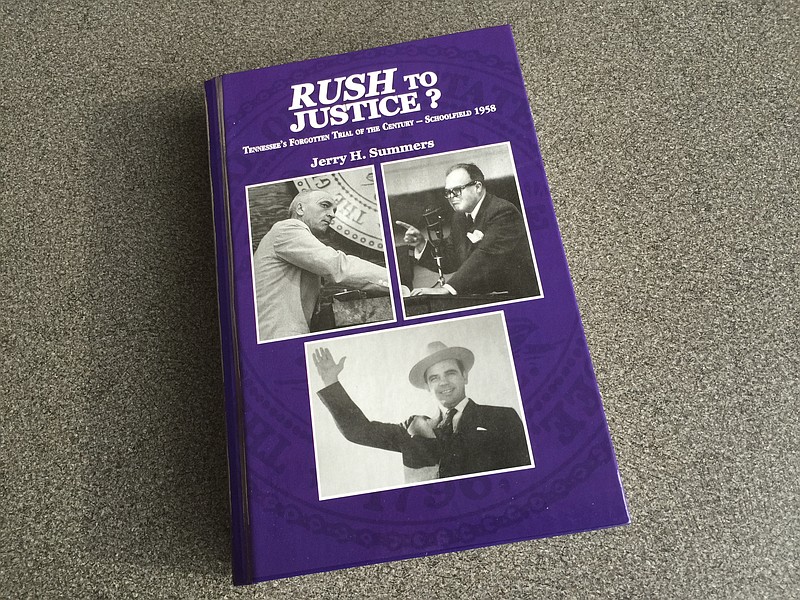What started with a few scribbled pages of notes has grown into untold stacks of old newspapers, bound copies of state records and a daunting collection of 130 audio discs documenting the 1958 impeachment trial of the late Hamilton County Judge Raulston Schoolfield.
Schoolfield, as old-timers might remember, was a lightning-rod Hamilton County Criminal Court judge who ran for governor of Tennessee - unsuccessfully - in 1954 on a segregationist platform. The U.S. Supreme Court's Brown v. Board of Education school desegregation case decision was fresh at the time, and emotions on both sides of the issue were raw.
Seeking the Democratic nomination for governor in 1954, Schoolfield challenged eventual winner Frank Clement, leaving some to wonder if Schoolfield's eventual impeachment had a political subtext. Clement later tapped Nashville attorney John Jay Hooker to help with the investigation of the Hamilton County judge.
As a judge, Schoolfield ran a "people's court" before television popularized the concept. He didn't wear a judge's robe, allowed smoking in his courtroom and let common sense be his guide, Summers said. He was also a born fighter who didn't have much use for diplomacy.
"He was stubborn and strong-willed, but he did what he thought was right," Summers said. "You have to admire the man for taking up unpopular causes, to try to help somebody who was deserving. But he couldn't survive today with all the media coverage and interest groups. It's just a different time."
With journalistic detachment, Summers, a successful Chattanooga trial lawyer and former assistant district attorney, has recreated Schoolfield's mid-century impeachment by the Tennessee Senate and his subsequent disbarment in a new book. Summers leaves it to readers to decide the merits of the case.
The book, "Rush to Justice? Tennessee's Forgotten Trial of the Century" (Waldenhouse Publishers Inc.), traces Schoolfield's life from his early days as a rebellious teenager who drifted from school to school, to his fight-filled young-adult years as a local attorney, to his apparent political demise after being impeached as a judge in 1958.
"I've tried to stay in the middle of the road," Summers said in an interview this week. "Everybody has an opinion about Raulston Schoolfield."
The impeachment trial, Summers said, dominated news reports of the day. Chattanooga's daily newspapers covered the event in Nashville gavel to gavel, and there were even extended broadcasts about the proceedings each evening on Chattanooga radio.
A second book highlighting Schoolfield's political comeback as a general sessions court judge here in the 1970s and early 1980s is in the works, Summers said.
On the surface, Schoolfield's story seems straightforward. One imagines a feisty, common-sense jurist who got so enmeshed in local and state politics that his list of detractors and political enemies grew unmanageable over time.
Summers, with a barrister's eye for detail, puts the evidence against Schoolfield under a microscope and examines his enduring political appeal despite the allegations of corruption.
"He always had the ability to attract 12,000 to 15,000 voters in Hamilton County," Summers explained.
At the heart of the impeachment case against Schoolfield was an allegation that, as a judge, he improperly helped local Teamsters accused of workplace violence. The allegations emerged during a 1957 congressional hearing into labor-management practices. Robert F. Kennedy was the chief counsel at the hearings.
Then, in 1958, the Tennessee Senate brought 22 articles of impeachment against Schoolfield, including an allegation involving the improper disposition of a cases against Teamsters Union Local 515.
In the end, Schoolfield was convicted on only three of the articles: accepting a 1950 Pontiac automobile from political friends, engaging in partisan political activity and using profanity towards and assistant district attorney.
"He was never convicted of any bribery charge," Summers explained.
While reluctant to give his opinion about Schoolfield's guilt or innocence, Summers allows that the judge, who died in 1982, was an enigma.
"I admire him for some things, but on other things he was bull-headed," Summers said.
Copies of "Rush to Justice?" are available at The Book Company in East Ridge or Summers' law offices in the James Building, 735 Broad St.
Summers' well-researched book is the definitive account of the life and times of one of Chattanooga's most colorful 20th-century figures.
Contact Mark Kennedy at mkennedy@timesfreepress.com or 423-757-6645. Follow him on Twitter @TFPCOLUMNIST. Subscribe to his Facebook updates at www.facebook.com/mkennedycolumnist.

